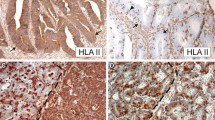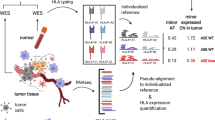Abstract
HLA class I loss or down-regulation is a widespread mechanism used by tumor cells to avoid tumor recognition by cytotoxic T lymphocytes, and thus favor tumor immune escape. Multiple mechanisms are responsible for these HLA class I alterations. In different epithelial tumors, loss of heterozygosity (LOH) at chromosome region 6p21.3, leading to HLA haplotype loss, occurs in 6–50% of all cases depending on the tumor entity. In this paper we report the frequency of LOH at 6p21 in 95 colorectal carcinomas (CRC) previously analyzed for altered HLA class I expression with immunohistological techniques. We used PCR microsatellite amplification of selected STR markers located on Chromosome 6 to identify LOH with DNA from microdissected tumor tissues and the surrounding stroma. Sequence-specific oligonucleotide analysis was performed in microdissected stroma and tumor cells for HLA typing, and to detect HLA haplotype loss. A high frequency (40%) of HLA haplotype loss was found in CRC. Eight tumors showed microsatellite instability. We sometimes observed two or more mechanisms responsible for HLA alteration within the same HLA-altered phenotype, such as LOH and HLA class I total loss. In 25 tumors (26%) no HLA class I alteration could be identified. These data are potentially relevant for CRC patients undergoing T-cell-based immunotherapy.




Similar content being viewed by others
References
Birkenkamp-Demtroder K, Christensen LL, Olesen SH, Frederiksen CM, Laiho P, Aaltonen LA, Laurberg S, Sorensen FB, Hagemann R, Orntoft TF (2002) Gene expression in colorectal cancer. Cancer Res 62:4352–4363
Boland CR (2002) Molecular basis for stool-based DNA tests for colorectal cancer: a primer for clinicians. Rev Gastroenterol Disord 2 [Suppl 1]:S12–S19
Boland CR, Thibodeau SN, Hamilton SR, Sidransky D, Eshleman JR, Burt RW, Meltzer SJ, Rodriguez-Bigas MA, Fodde R, Ranzani GN, Srivastava S (1998) A National Cancer Institute workshop on microsatellite instability for cancer detection and familial predisposition: development of international criteria for the determination of microsatellite instability in colorectal cancer. Cancer Res 58:5248–5257
Boulay JL, Mild G, Lowy A, Reuter J, Lagrange M, Terracciano L, Laffer U, Herrmann R, Rochlitz C (2002) SMAD4 is a predictive marker for 5-fluorouracil-based chemotherapy in patients with colorectal cancer. Br J Cancer 87:630–634
Cabrera T, Angustias Fernandez M, Sierra A, Garrido A, Herruzo A, Escobedo A, Fabra A, Garrido F (1996) High frequency of altered HLA class I phenotypes in invasive breast carcinomas. Hum Immunol 50:127–134
Cabrera T, Collado A, Fernandez MA, Ferron A, Sancho J, Ruiz-Cabello F, Garrido F (1998) High frequency of altered HLA class I phenotypes in invasive colorectal carcinomas. Tissue Antigens 52:114–123
Cabrera T, Salinero J, Fernandez MA, Garrido A, Esquivias J, Garrido F (2000) High frequency of altered HLA class I phenotypes in laryngeal carcinomas. Hum Immunol 61:499–506
Cabrera CM, Jimenez P, Cabrera T, Esparza C, Ruiz-Cabello F, Garrido F (2003) Total loss of MHC class I in colorectal tumors can be explained by two molecular pathways: beta2-microglobulin inactivation in MSI-positive tumors and LMP7/TAP2 downregulation in MSI-negative tumors. Tissue Antigens 61:211–219
Carethers JM, Hawn MT, Greenson JK, Hitchcock CL, Boland CR (1998) Prognostic significance of allelic lost at chromosome 18q21 for stage II colorectal cancer. Gastroenterology 114:1188–1195
Choi SW, Lee KJ, Bae YA, Min KO, Kwon MS, Kim KM, Rhyu MG (2002) Genetic classification of colorectal cancer based on chromosomal loss and microsatellite instability predicts survival. Clin Cancer Res 8:2311–2322
Coulie PG, Ikeda H, Baurain JF, Chiari R (1999) Antitumor immunity at work in a melanoma patient. Adv Cancer Res 76:213–242
Feenstra M, Verdaasdonk M, van der Zwan AW, de Weger R, Slootweg P, Tilanus M (2000) Microsatellite analysis of microdissected tumor cells and 6p high density microsatellite analysis in head and neck squamous cell carcinomas with down-regulated human leukocyte antigen class I expression. Lab Invest 80:405–414
Garcia-Lora A, Algarra I, Garrido F (2003) MHC class I antigens, immune surveillance, and tumor immune escape. J Cell Physiol 195:346–355
Garrido F, Algarra I (2001) MHC antigens and tumor escape from immune surveillance. Adv Cancer Res 83:117–158
Garrido F, Cabrera T, Concha A, Glew S, Ruiz-Cabello F, Stern PL (1993) Natural history of HLA expression during tumour development. Immunol Today 14:491–499
Garrido F, Ruiz-Cabello F, Cabrera T, Perez-Villar JJ, Lopez-Botet M, Duggan-Keen M, Stern PL (1997a) Implications for immunosurveillance of altered HLA class I phenotypes in human tumours. Immunol Today 18:89–95
Garrido F, et al (1997b) HLA, genetic diversity of HLA. In: Charron D (ed) Functional and medical implication, vol I. EDK, Paris, pp 543–545
Guidoboni M, Gafa R, Viel A, Doglioni C, Russo A, Santini A, Del Tin L, Macri E, Lanza G, Boiocchi M, Dolcetti R (2001) Microsatellite instability and high content of activated cytotoxic lymphocytes identify colon cancer patients with a favorable prognosis. Am J Pathol 159:297–304
Jernvall P, Makinen MJ, Karttunen TJ, Makela J, Vihko P (1999) Loss of heterozygosity at 18q21 is indicative of recurrence and therefore poor prognosis in a subset of colorectal cancers. Br J Cancer 79:903–908
Jimenez P, Canton J, Collado A, Cabrera T, Serrano A, Real LM, Garcia A, Ruiz-Cabello F, Garrido F (1999) Chromosome loss is the most frequent mechanism contributing to HLA haplotype loss in human tumors. Int J Cancer 83:91–97
Koopman LA, Corver WE, van der Slik AR, Giphart MJ, Fleuren GJ (2000) Multiple genetic alterations cause frequent and heterogeneous human histocompatibility leukocyte antigen class I loss in cervical cancer. J Exp Med 191:961–976
Maleno I, Lopez-Nevot MA, Cabrera T, Salinero J, Garrido F (2002) Multiple mechanisms generate HLA class I altered phenotypes in laryngeal carcinomas: high frequency of HLA haplotype loss associated with loss of heterozygosity in chromosome region 6p21. Cancer Immunol Immunother 51:389–396
Maleno I, Lopez Nevot MA, Seliger B, Garrido F (2004) Low frequency of HLA haplotype loss associated with loss of heterozygocity in chromosome region 6p21 in clear renal cell carcinomas. Int J Cancer 109:636–638
Marshall JL, Hoyer RJ, Toomey MA, Faraguna K, Chang P, Richmond E, Pedicano JE, Gehan E, Peck RA, Arlen P, Tsang KY, Schlom J (2000) Phase I study in advanced cancer patients of a diversified prime-and-boost vaccination protocol using recombinant vaccinia virus and recombinant nonreplicating avipox virus to elicit anti-carcinoembryonic antigen immune responses. J Clin Oncol 18:3964–3973
Martinez-Lopez E, Abad A, Font A, Monzo M, Ojanguren I, Pifarre A, Sanchez JJ, Martin C, Rosell R (1998) Allelic loss on chromosome 18q as a prognostic marker in stage II colorectal cancer. Gastroenterology 114:1180–1187
Morse MA, Deng Y, Coleman D, Hull S, Kitrell-Fisher E, Nair S, Schlom J, Ryback ME, Lyerly HK (1999) A Phase I study of active immunotherapy with carcinoembryonic antigen peptide (CAP-1)-pulsed, autologous human cultured dendritic cells in patients with metastatic malignancies expressing carcinoembryonic antigen. Clin Cancer Res 5:1331–1338
Naito Y, Saito K, Shiiba K, Ohuchi A, Saigenji K, Nagura H, Ohtani H (1998) CD8+ T cells infiltrated within cancer cell nests as a prognostic factor in human colorectal cancer. Cancer Res 58:3491–3494
Ramal LM, Feenstra M, van der Zwan AW, Collado A, Lopez-Nevot MA, Tilanus M, Garrido F (2000a) Criteria to define HLA haplotype loss in human solid tumors. Tissue Antigens 55:443–448
Ramal LM, Maleno I, Cabrera T, Collado A, Ferron A, Lopez-Nevot MA, Garrido F (2000b) Molecular strategies to define HLA haplotype loss in microdissected tumor cells. Hum Immunol 61:1001–1012
Seymour K, Pettit S, O’Flaherty E, Charnley RM, Kirby JA (1999) Selection of metastatic tumour phenotypes by host immune systems. Lancet 354:1989–1991
Shankaran V, Ikeda H, Bruce AT, White JM, Swanson PE, Old LJ, Schreiber RD (2001) IFNgamma and lymphocytes prevent primary tumour development and shape tumour immunogenicity. Nature 410:1107–1111
Smyth MJ, Trapani JA (2001) Lymphocyte-mediated immunosurveillance of epithelial cancers? Trends Immunol 22:409–411
Villunger A, Strasser A (1999) The great escape: is immune evasion required for tumor progression? Nat Med 5:874–875
Acknowledgements
This work was partially supported by the Fondo de Investigaciones Sanitarias, the Plan Andaluz de Investigación, Instituto de Salud Carlos III-Red de Centros de Cancer-RTICCC-contract no. CO3/10 and the Plan Nacional, Spain. We thank K. Shashok for improving the English in the manuscript.
Author information
Authors and Affiliations
Corresponding author
Rights and permissions
About this article
Cite this article
Maleno, I., Cabrera, C.M., Cabrera, T. et al. Distribution of HLA class I altered phenotypes in colorectal carcinomas: high frequency of HLA haplotype loss associated with loss of heterozygosity in chromosome region 6p21. Immunogenetics 56, 244–253 (2004). https://doi.org/10.1007/s00251-004-0692-z
Received:
Revised:
Published:
Issue Date:
DOI: https://doi.org/10.1007/s00251-004-0692-z




